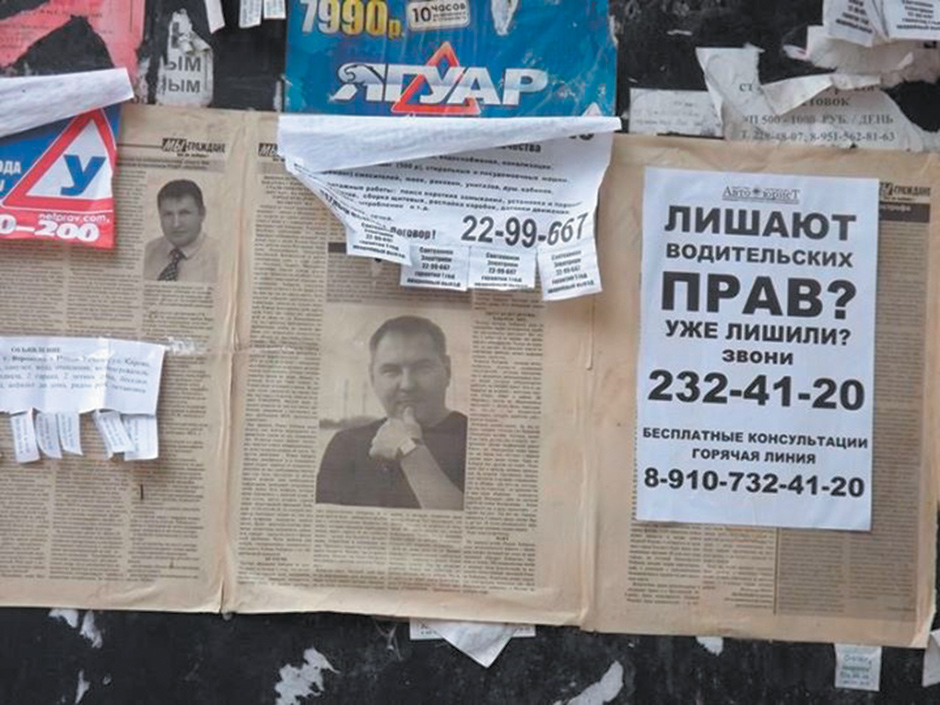You’ve probably never heard of Roman Khabarov—which is a pity, because he’s potentially one of the most important opposition activists in Russia today and he was arrested during the recent Olympics, when few would notice. Khabarov is a former cop from the city of Voronezh (some four hundred miles north of Sochi). During his eighteen years in the police force Khabarov “was openly critical of the government’s law enforcement policies and cooperated with human rights activists,” according to a recent brief by Human Rights Watch. In 2011, his bosses finally kicked him off the force, and Khabarov started a new life as a legal consultant to victims of police abuse. Shortly after his firing three years ago, he jolted his hometown by publicly accusing the Voronezh police force of widespread corruption, criminal behavior, and torture.
The local authorities tried to retaliate by charging him with libel, but the case soon collapsed. Sources within the police told Khabarov that higher-ups in the force had vowed to get revenge, and on February 12 he was arrested, accused of being “a member of a criminal group that allegedly offered a network of unlawful gambling spots in the region.” On February 14, a local court refused Khabarov bail, and ruled that he should remain under pretrial detention until the end of March. Chances are that he’ll stay in prison much longer than that. Russian courts are notoriously subservient to the political powers-that-be, and Khabarov’s case certainly hasn’t been helped by his open advocacy of fair elections and his participation in some of the public demonstrations in 2011 and 2012, including the remarkable opposition rally in Moscow’s Bolotnaya Square in 2012.
If there is any human rights activist in Russia whose work is likely to have some sympathy from the Russian public, it may well be Khabarov. Police corruption is one aspect of the current system that the average Russian citizen encounters on an everyday basis—to a point where it can be hard to distinguish police officials from the crooks they’re supposed to be pursuing. Vladimir Putin’s regime rests on the pretense that he has brought internal peace to Russia by enforcing a tough regime of law and order (“dictatorship of the law,” as Kremlin doublespeak calls it). By exposing the reality of police malfeasance, Khabarov gives the lie to such claims.
Yet Khabarov’s case remains virtually unknown, both inside and outside of Russia. Reporters rarely have cause to visit Voronezh, an industrial city of a million people. What is perhaps most striking of all about Khabarov’s recent arrest, though, is that it took place five days into the Winter Olympics at Sochi. If the Voronezh authorities assumed that the attention of the world would be directed elsewhere during the 2014 games, they were right.
Many outside observers assumed that the Russian government would effectively declare a truce against its opponents during the Olympics—a notion reinforced by a series of high-profile pardons issued by President Putin in the weeks before the games began. Among those released from jail were billionaire Mikhail Khodorkovsky, two members of the Pussy Riot performance group, and several international Greenpeace activists arrested after climbing onto an oil rig in the Arctic Ocean. Surely the Kremlin wouldn’t dare to besmirch the positive PR emanating from Sochi by going after its critics in public.
In fact, though, the machinery of state repression continued its work even while the games were underway. On February 12, the same day as Khabarov’s arrest, another court sentenced environmental activist Yevgeny Vitishko to three years in jail. His alleged crime: he had violated parole from a previous conviction by spray-painting a fence. It was not hard to see that the real reason for the harsh verdict was simple retribution for Vitishko’s public criticisms of the ecological damage caused by Olympic construction projects. No Russian official would have made such a potentially controversial move without first ensuring that it was sanctioned from on high; that such approval was given attests to Putin’s determination to stamp out even the slightest signs of dissent no matter what the potential cost. His bet appears to have paid off: Vitishko’s sentencing drew little outcry internationally.
Fear of terrorist attacks dominated much of the coverage in the run-up to Sochi, given that the games were being held close to a region that is still plagued by a low-level Islamist insurgency. In the end, happily, the militants of the North Caucasus opted to refrain from going after the Olympics. The seamless cordon imposed on Sochi by Russian security forces may well have had something to do with it. It is characteristic of Putin’s regime, however, that the same expansive security apparatus was also used to suppress peaceful protests in the region.
Advertisement
I speak of the Circassians, the local ethnic minority that tried to use the Games to draw attention to the historical injustices committed against them by the tsarist empire in the mid-nineteenth century (and largely ignored by the world). After fighting a long war of resistance against advancing Russian troops, the last Circassian fighters finally surrendered at Krasnaya Polyana (which also served as the venue for alpine sports during the Winter Olympics) exactly 150 years before the opening of the games. Most of those who had survived the Russians’ scorched-earth counterinsurgency tactics were then deported to the Ottoman Empire under profoundly inhumane conditions. Some scholars estimate the number of Circassian deaths between 1860 and 1864 at around 1.5 million. Some have referred to it as the first modern genocide.
Yet this tragedy is largely forgotten today—which is why the Circassians, both inside Russia and in their widespread global diaspora, decided to use the Olympics to call attention to their story. To their credit, Circassian activists have insisted upon a strategy of strictly nonviolent protest. Needless to say, this appears to make little difference to the Russian authorities. When several groups of Circassian demonstrators converged on the city of Nalchik on February 7, just as the games were beginning, they were met by heavily armed riot police, Interior Ministry troops, and operatives of the Federal Security Service. At least thirty-seven were detained. On Valentine’s Day, when the games were in full flow, the police arrested Askar Sokht, a leading pro-Moscow Circassian who had dared to criticize the Olympic opening ceremony for omitting any mention of the Circassian presence in the region where the games were taking place. This, too, was a side of the Olympics that largely escaped public notice.
As the Olympics wound down, a delegation from Pussy Riot, with their usual unerring knack for generating publicity, caused an immense stir by staging one of their provocative performances in Sochi—whereupon they were attacked by whip-wielding Cossacks. Soon thereafter, they turned up to join the crowd outside the Moscow courthouse where a judge was sentencing eight participants in the Bolotnaya rally to multiyear terms of imprisonment. (One young father received two years for throwing a lemon at police.) The crowd of sympathizers was set upon by riot police swinging truncheons and fists; some four hundred people were ultimately arrested. Among those picked up was the opposition leader Alexei Navalny, who was sentenced to seven days in jail for the crime of disobeying police orders at the scene.
It is possible, of course, that Russia’s hosting of the Olympics did restrain Putin from intervening more actively in support of Ukraine’s President Viktor Yanukovych against the anti-government protesters who ultimately brought about his downfall on February 21, just two days before the official ending of the games. It’s hard to imagine that Putin would have dared to endanger the positive image engendered by the Olympics by sending additional Russian forces into the Crimea while the games were still on—even if it’s entirely within the realm of possibility that he was already mulling over scenarios for his intervention there well in advance of the event.
In any event, the violence outside the Bolotnaya sentencing prompted some media commentators to declare the end of Putin’s Olympic “truce.” In fact, though, what we were witnessing was merely business as usual. If anyone still harbors any illusions about the nature of the police state that currently holds sway in Russia, the dispiriting reality behind the pomp and circumstance of the Winter Games should dispel them for good.
This Issue
April 3, 2014
He Remade Our World
Elegy for a Country’s Seasons




